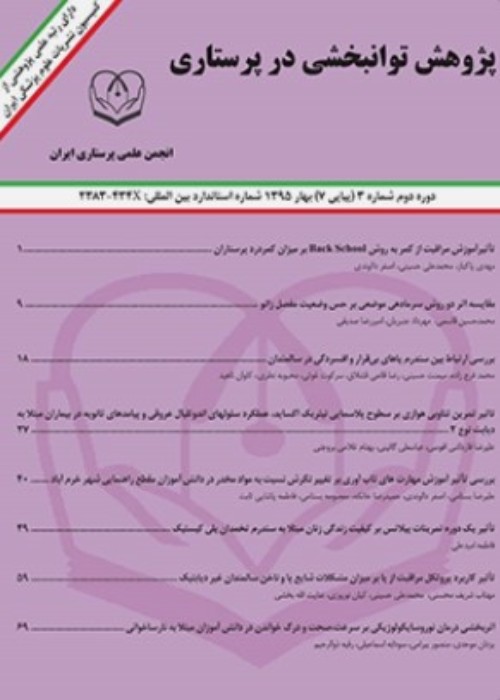Investigating the effectiveness of resiliency pattern on improving the quality of life of multiple sclerosis patients: a follow up study
Author(s):
Article Type:
Research/Original Article (دارای رتبه معتبر)
Abstract:
Introduction
Regarding the prevalence of psychological disorders in multiple sclerosis patients, some reports have considered the efficacy of a resilient model prior to previous treatments. Therefore, the aim of this study was to investigate the effectiveness of the resiliency model on improving the quality of life components in patients with multiple sclerosis followed by three months.
Methods
This study was an experimental study in which pre-test-post-test design with control group was used. The statistical population of the study was 631 people. The sample consisted of 40 MS patients in Tabriz in 2018. First of all, 220 patients with multiple sclerosis, a quality of life test, were selected. Then, the subjects from the above-mentioned society, who were classified as unsatisfactory according to the cutoff criteria, were selected (82 subjects). 20 subjects were assigned to the experimental group and 20 controls were randomly selected. The intervention based on resilient training was performed in 12 sessions of 90 minutes, one session per week. After the end of the sessions, quality of life test for posttest was performed again in two groups and after three months after the end of the intervention, a post-test was performed. Data were analyzed using covariance analysis.
Results
All subjects were male and the mean age of the subjects in the experimental group was 42.35 ± 5.84 and the mean age of the subjects in the control group was 42.35 ± 5.84. Data analysis showed that there was a significant difference between the mean scores of post-test in the experimental and control groups (P < 0.01), so that the intervention improved the components of quality of life in the experimental group. Also, after a three month follow up, the model of resilience has had a lasting effect on the quality of life of MS patients.
Conclusions
Considering the positive effect of resilient education, the use of this training in planning mental health interventions, especially in patients with multiple sclerosis, is recommended.Keywords:
Language:
Persian
Published:
Iranian Journal of Rehabilitation Research in Nursing, Volume:5 Issue: 3, 2019
Pages:
31 to 38
magiran.com/p1985819
دانلود و مطالعه متن این مقاله با یکی از روشهای زیر امکان پذیر است:
اشتراک شخصی
با عضویت و پرداخت آنلاین حق اشتراک یکساله به مبلغ 1,390,000ريال میتوانید 70 عنوان مطلب دانلود کنید!
اشتراک سازمانی
به کتابخانه دانشگاه یا محل کار خود پیشنهاد کنید تا اشتراک سازمانی این پایگاه را برای دسترسی نامحدود همه کاربران به متن مطالب تهیه نمایند!
توجه!
- حق عضویت دریافتی صرف حمایت از نشریات عضو و نگهداری، تکمیل و توسعه مگیران میشود.
- پرداخت حق اشتراک و دانلود مقالات اجازه بازنشر آن در سایر رسانههای چاپی و دیجیتال را به کاربر نمیدهد.
دسترسی سراسری کاربران دانشگاه پیام نور!
اعضای هیئت علمی و دانشجویان دانشگاه پیام نور در سراسر کشور، در صورت ثبت نام با ایمیل دانشگاهی، تا پایان فروردین ماه 1403 به مقالات سایت دسترسی خواهند داشت!
In order to view content subscription is required
Personal subscription
Subscribe magiran.com for 70 € euros via PayPal and download 70 articles during a year.
Organization subscription
Please contact us to subscribe your university or library for unlimited access!




